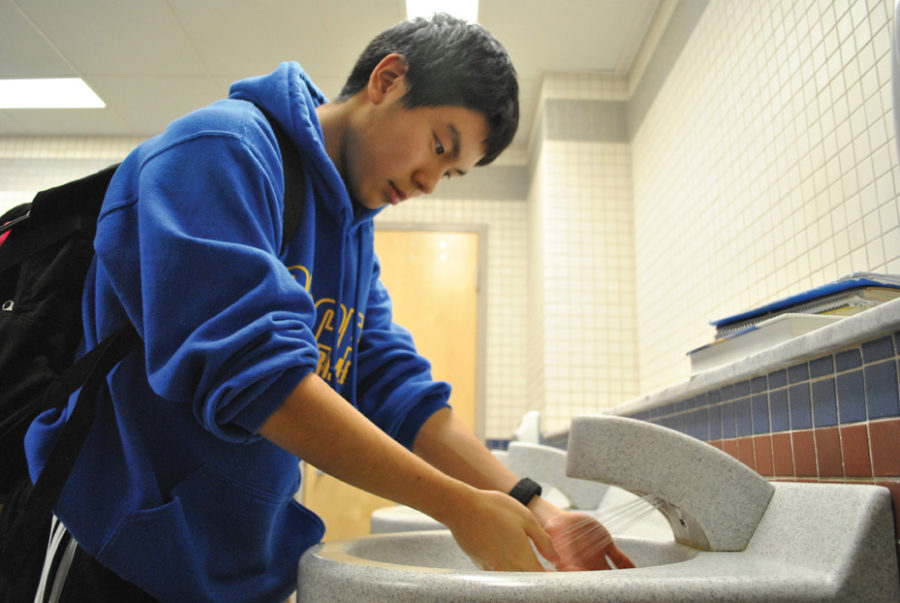For senior Jake Robinson, his last year of high school was supposed to involve lots of sporting events and perhaps the occasional class prank; it was not supposed to involve getting sick multiple times in just a few months. Yet Robinson, who has missed five days of school this year, said the experience did have a silver lining; it made him more aware of the health risks of a school environment.
“I stayed home for a lot of days this year because I got strep throat and later got pharyngitis,” Robinson said. “I don’t think it got around or anything because I was the only one who had it, but it made me realize that I had to be more careful about diseases because things can spread really easily here at school.”

Robinson was hardly the only person to become sick this year. According to a Nov. 1 article in The Indianapolis Star, a potential outbreak of pertussis — also known as the whooping cough — at Hamilton Southeastern schools a few months ago led the district to inform all parents of the disease’s signs and symptoms as a precaution.
Carmel Clay Schools followed suit in late November, and school nurse Carol Gelatt said she believes this school has done well to prepare for such health problems.
“One of the new vaccines we recently required students to get was a vaccine to protect against pertussis, so that specific disease is not likely to be a problem for students here,” Gelatt said. “The school is required to notify the Indiana Department of Health if we have 20 percent or more of students absent because of a disease.”
There are, however, different procedures for notifying the entire community.
“The school usually alerts the community significantly earlier as a preventative measure,” Gelatt said. “When students have a fever of over 100 degrees Fahrenheit, we strongly encourage them to stay home until the fever remains less than 100 degrees for at least 24 hours without using fever reducing medicine.”
As for David Liang, a self-proclaimed health-conscious student and sophomore, he said he believes the school does its best to keep students safe.
However, since the presence of so many people in so little space makes it easy for diseases to spread, Liang also said he thinks it is primarily students’ responsibility to keep themselves healthy.
“My friends say I’m a germophobe, but I’m just trying to stay healthy. I wash my hands before every meal and whenever I touch something dirty. I used to carry hand sanitizer with me at all times, and I’m a bit more careful around people who were recently sick,” Liang said. The school does what it can to keep kids safe, but I think the person’s behaviors have the biggest impact on whether they get sick or not.”
Liang’s ideas are supported by evidence from the Center for Disease Control (CDC). The organization finds that other than vaccinations, everyday actions like hand washing and using tissues when sneezing or coughing are the most effective ways to remain healthy.
As for this school, Gelatt said the health center follows different guidelines for each disease, but also has policies to deal with outbreaks in general.
“The local health department has information about symptoms, methods of prevention and other information about almost every communicable disease, and we follow those suggestions closely,” Gelatt said. “The school can notify parents and students of potential health concerns, but it is up to students to keep themselves healthy. Washing your hands and being careful when you sneeze or cough not only keeps yourself healthy, but also makes school safer for everybody else. It’s also important to eat a balanced diet and get the proper amount of sleep.”
For Robinson, the experience of being sick for so long was anything but enjoyable. He said that while some students may relish the opportunity to stay home, missing so many classes only made his return to school all the more difficult.
“I’ve always been a person who tries to come to school every day I can, so missing so much class was really frustrating because of all the make-up work I had afterward,” Robinson said. “Getting strep throat and pharyngitis was bad enough, and having to do all that work when you’re just recovering made it even worse.”


































![British royalty are American celebrities [opinion]](https://hilite.org/wp-content/uploads/2024/03/Screenshot-2024-03-24-1.44.57-PM.png)


















![Review: “Suits” is a perfect blend of legal drama and humor [MUSE]](https://hilite.org/wp-content/uploads/2024/04/unnamed-1.png)
![Chelsea Meng on her instagram-run bracelet shop [Biz Buzz]](https://hilite.org/wp-content/uploads/2024/04/IMG_2446-1200x838.jpg)
![Review: Quiet on Set: The Dark Side of Kids TV is the long awaited exposé of pedophilia within the children’s entertainment industry [MUSE]](https://hilite.org/wp-content/uploads/2024/04/unnamed.jpg)
![Review: “The Iron Claw” cannot get enough praise [MUSE]](https://hilite.org/wp-content/uploads/2024/04/unnamed.png)
![Review: “The Bear” sets an unbelievably high bar for future comedy shows [MUSE]](https://hilite.org/wp-content/uploads/2024/03/unnamed.png)
![Review in Print: Maripaz Villar brings a delightfully unique style to the world of WEBTOON [MUSE]](https://hilite.org/wp-content/uploads/2023/12/maripazcover-1200x960.jpg)
![Review: “The Sword of Kaigen” is a masterpiece [MUSE]](https://hilite.org/wp-content/uploads/2023/11/Screenshot-2023-11-26-201051.png)
![Review: Gateron Oil Kings, great linear switches, okay price [MUSE]](https://hilite.org/wp-content/uploads/2023/11/Screenshot-2023-11-26-200553.png)
![Review: “A Haunting in Venice” is a significant improvement from other Agatha Christie adaptations [MUSE]](https://hilite.org/wp-content/uploads/2023/11/e7ee2938a6d422669771bce6d8088521.jpg)
![Review: A Thanksgiving story from elementary school, still just as interesting [MUSE]](https://hilite.org/wp-content/uploads/2023/11/Screenshot-2023-11-26-195514-987x1200.png)
![Review: When I Fly Towards You, cute, uplifting youth drama [MUSE]](https://hilite.org/wp-content/uploads/2023/09/When-I-Fly-Towards-You-Chinese-drama.png)
![Postcards from Muse: Hawaii Travel Diary [MUSE]](https://hilite.org/wp-content/uploads/2023/09/My-project-1-1200x1200.jpg)
![Review: Ladybug & Cat Noir: The Movie, departure from original show [MUSE]](https://hilite.org/wp-content/uploads/2023/09/Ladybug__Cat_Noir_-_The_Movie_poster.jpg)
![Review in Print: Hidden Love is the cute, uplifting drama everyone needs [MUSE]](https://hilite.org/wp-content/uploads/2023/09/hiddenlovecover-e1693597208225-1030x1200.png)
![Review in Print: Heartstopper is the heartwarming queer romance we all need [MUSE]](https://hilite.org/wp-content/uploads/2023/08/museheartstoppercover-1200x654.png)






















![Review: Ladybug & Cat Noir: The Movie, departure from original show [MUSE]](https://hilite.org/wp-content/uploads/2023/09/Ladybug__Cat_Noir_-_The_Movie_poster-221x300.jpg)

![Review: Next in Fashion season two survives changes, becomes a valuable pop culture artifact [MUSE]](https://hilite.org/wp-content/uploads/2023/03/Screen-Shot-2023-03-09-at-11.05.05-AM-300x214.png)
![Review: Is The Stormlight Archive worth it? [MUSE]](https://hilite.org/wp-content/uploads/2023/10/unnamed-1-184x300.png)


